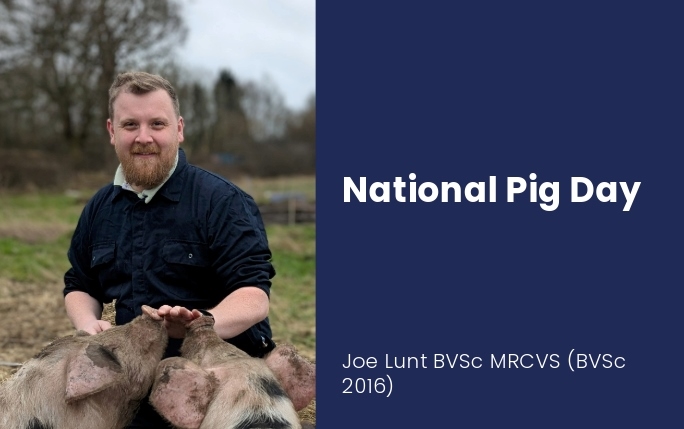Celebrating National Pig Day with Joe Lunt

Observed annually, National Pig Day recognises the importance of pigs in agriculture, science, and beyond. It’s an opportunity to highlight the expertise and dedication of veterinary professionals working with pigs, so this year we spoke to Joe Lunt (BVSc 2016) about his work caring for pigs and their diets.
Joe settled into pig practice after graduating, gaining experience in both the indoor and outdoor pig industry as well as animal nutrition. He currently works for a pig industry consultant but is soon returning to pig-only clinical practice. Joe was named Young Farm Vet of the Year at the National Pig Association Awards 2024.
Do you have any memories from your time as a vet student at Liverpool to share?
My favourite part of being at the University of Liverpool’s School of Veterinary Science was the true community spirit there is in the city of Liverpool, the University as a whole, and especially the School of Veterinary Science.
Liverpool was always my first-choice university, as my family are Scouse on my Dad’s side and I grew-up with him telling me stories of my great-grandfather Stanley (who I am named after). Stanley was the University’s boilerman after he left the merchant navy; he disposed of pathologic veterinary specimens in the boiler.
I also have to say that being in the old School of Veterinary Science building (now campus accommodation) holds a certain nostalgia for me – it had a proper common room that we would hang out in, with our £1 for two butties from the sandwich shop!
Finally, members of staff especially Camille Vaillant (Senior Lecturer) explaining embryology with her cardigan and Vivien Jump (Admissions) who was a real champion for the students.
Did anyone inspire you when you were a student?
Emma Fishburne, who is still teaching and who I have remained friends with, was and remains a great support for the students – I remember her teaching realism in how to treat clinical cases as a first opinion clinician. She also championed varied routes as being just as viable as traditional ones, having both an intercalation and PhD (in pigs!) herself.
I must also mention Liz Crowsley (BVSc 1984), who I worked with as a volunteer at the Willows Vet Group in Hartford, Cheshire, from age 14. Liz also graduated from the University of Liverpool but sadly passed away shortly before I found out I would also be attending. She was a true inspiration to me and was a constant supporter in my dream of becoming a vet.
Tell us about your career. How did you become interested in working with pigs?
Throughout my studies, I was lucky enough to have some particularly good Population Health placements in Pigs, Poultry and Aquaculture, both here in the UK and abroad. I gained quite a lot of experience at Crowshall Poultry practice, and while I enjoyed poultry practice, I also enjoyed individual animal veterinary care – which pig practice now enables me to do.
I have had a varied career to date, working in private and corporate practice, which both have their advantages, and I have also worked for a large farming integrator. Most recently I have worked for a multinational nutrition company while gaining my MSc in Animal Nutrition (through Glasgow Vet School and SRUC). I am soon returning to pig-only clinical vet work, as though nutrition is a passion, vetting is a core value.
My career so far has enabled me to travel, meet lots of people and, most importantly, bring home the bacon!
What do you think is the biggest challenge facing pig health and welfare today?
Globally this must be notifiable disease; we still have an elevated level of ASF in Europe, which is easiest to describe as pig Ebola, as it has similar signs and transition routes. Also, the concerning outbreak of Foot and Mouth in Germany and the fact that pigs are often a mixing vessel for both avian and human flu strains.
If you could bust one myth about pigs, what would it be?
Micropigs are not so micro, with the Vietnamese Micropig (or Pot-bellied Pig) nearing 90kg fully grown! Vietnamese Micropigs are also different to commercial Micropigs which, while bred to remain small, can grow much larger than expected (especially with a poor diet)!
How can alumni keep up with what you're doing?
I am active contributor to Pig World, Farmers Weekly, and return to the School of Veterinary Science to deliver some husbandry lectures. I am on LinkedIn, feel free to connect with me there!
Thank you, Joe, for helping us celebrate National Pig Day. If you’d like to share your own veterinary career journey or professional reflections with the University of Liverpool Veterinary Alumni Association, we’d love to hear from you via ulvaa@liverpool.ac.uk.